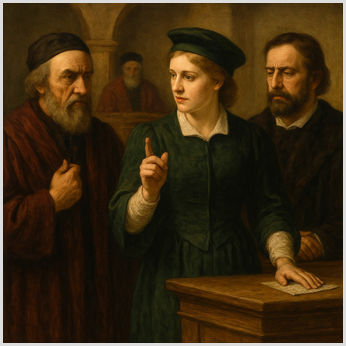William Shakespeare's The Merchant of Venice was written between 1596 and 1598. It tells the story of the Venetian merchant Antonio as he defaults on a loan taken out on behalf of his friend, Bassanio. The loan was provided by Shylock, a Jewish moneylender in Venice, and the play explores the consequences of this default, including a desire for revenge.
This play is renowned for its rich, complex characters and profound themes, including prejudice and justice. It was written during the Elizabethan era, at a time when religious tensions were high between Christians and Jews. The characters highlight these tensions and raise moral questions that remain relevant today. Key characters like Shylock, Antonio, Portia and Bassanio reflect societal issues of their time and the perspective William Shakespeare had on the society he lived in.
This article explored the key characters in The Merchant of Venice. We will also look at the supporting character list. We will provide clear insights by providing plot examples and key quotes for each. This is suitable for GCSE English Literature students preparing for their exams. If you need support with your revision, TeachTutti has qualified GCSE English Literature tutors who can tutor you in person or online using the TeachTutti learning platform.
Shylock
The character of Shylock is arguably the most controversial in the play. His actions make him an antagonist, yet he is also victimised by the attitudes of society, representing prejudice and revenge. Elizabethan England was marked by widespread antisemitism, and Jews were often stereotyped in literature of the time, presented as villains. Shakespeare presents a nuanced picture, drawing on this societal backdrop, while also humanising Shylock by showing the pain and humiliation he has experienced from this mistreatment.
Shylock and Antonio have the main conflict of the play. Antonio mocks and humiliates Shylock regularly at the beginning of the play, ridiculing his occupation because he lends money without interest. Shylock resents this treatment by Antonio, which leads him to set horrifying conditions when Antonio needs a loan for his friend Bassanio. Antonio signs the contract that stipulates that, if he fails to repay the loan, Shylock will claim "a pound of flesh". This bond reflects the anger Shylock holds towards the Christian characters in the play and the prejudice he has endured:
"If you prick us, do we not bleed? If you tickle us, do we not laugh?... And if you wrong us, shall we not revenge?" (Act 3, Scene 1)
This speech reflects the injustice he has endured, which complicates our view of him. He demands justice when Antonio can't repay his debt, demanding a pound of flesh above monetary compensation. When Shylock is forced to convert to Christianity and loses his wealth, we are left with mixed emotions. The audience feels some pity for his tragic downfall due to his persecution, yet some will feel that justice has been served due to his relentless pursuit of revenge.
Antonio
Antonio is the merchant referred to in the title of the play. He is a complex character who represents loyalty, generosity and melancholy. He is a respected Christian living in Venice. Admired by his friends and wealthy, he enjoys a privileged position in Venetian society. Bassanio looks up to him as Antonio is willing to help others selflessly, having bailed him out numerous times in the past.
Antonio is also sad, as shown in his opening line. This is often interpreted as loneliness and potentially unrequited affection for Bassanio. He may also be concerned about losing his fortune and his business ventures. It also could be due to a sense of unease about the changing Venetian economy and society.
"In sooth, I know not why I am so sad." (Act 1, Scene 1)
When Bassanio wants to woo the beautiful and wealthy heiress Portia, Antonio agrees to fund him. However, 3,000 ducats are required to be a suitor, and Antonio has no liquid cash, with his ships busy at sea. He is forced to turn to Shylock, risking his life by agreeing to forfeit "a pound of flesh" if the debt is unpaid. This recklessness reflects his devotion to friendship and sets the scene for the central conflict of the play.
All of Antonio's ships are lost at sea during a storm, and he can't repay the loan. He faces death with courage when he calmly accepts his fate in court, reflecting his stoic character and sense of honour:
"I am a tainted wether of the flock, / Meetest for death." (Act 4, Scene 1)
This acceptance contrasts with Shylock's insistence on vengeance and reinforces the contrast between mercy and justice. He is eventually rescued through Portia's clever intervention, which condemns and humiliates Shylock.
Portia
Portia is a wealthy heiress from Belmont. She is intelligent, witty and independent. Her actions challenge the traditional gender roles in the Elizabethan era, where women normally had limited freedom and influence, including in marriage and law. She is the saviour of Antonio at the end of the play in resolving the central conflict, and one of Shakespeare's most memorable heroines.
To win the hand of Portia, her father left a will that requires the suitor to correctly choose from three caskets: gold, silver, or lead. Portia ensures she has a say over the outcome by subtly guiding Bassanio, her preferred suitor. For example, she requests music and makes a speech about "fancy", which directs him towards the lead casket. When Bassanio chooses the correct casket, she expresses her happiness and willingness to share her life and fortune with him. This highlights her strong, assertive character:
"Myself and what is mine to you and yours / Is now converted." (Act 3, Scene 2)
She resolves to save Antonio from Shylock's bond when she disguises herself as the male lawyer, "Balthazar". This shows true strength and intelligence, and she persuades the judge for mercy in one of the playwright's iconic speeches. Her compassion contrasts sharply with Shylock's unbending pursuit of revenge, while her legal knowledge turns the moneylender's claim against him, freeing Antonio:
"The quality of mercy is not strain'd; / It droppeth as the gentle rain from heaven / Upon the place beneath." (Act 4, Scene 1)
Shakespeare presents intelligence as a form of empowerment through Portia. She ultimately is a symbol of fairness, justice, and the importance of moral values.
Bassanio
Bassanio is Antonio's closest friend. He is a Venetian nobleman who drives the romantic and dramatic narrative of the play. Initially, he is presented as impulsive and financially irresponsible, having to seek support from his friend Antonio numerous times in the past.
He seeks Antonio's financial help early in the play, with the hope of courting Portia, a wealthy heiress. He is candid, admitting his extravagance and financial mismanagement. This honesty reveals his self-awareness and also helps us to learn about Antonio's generosity, leading him towards the dangerous bond with Shylock:
"'Tis not unknown to you, Antonio, / How much I have disabled mine estate / By something showing a more swelling port / Than my faint means would grant continuance." (Act 1, Scene 1)
When Bassanio chooses the correct casket and wins the hand of Portia, he is sincere in his emotions. He demonstrates that his affection is genuine and not merely due to financial gain. His friendship and loyalty to Antonio are also evident when he is prepared to sacrifice everything to save his friend's life:
"But life itself, my wife, and all the world, / Are not with me esteemed above thy life." (Act 4, Scene 1)
This crucial moment in the story underlines the complexity of his character. Initially presented as superficial and materialistic, Bassanio ultimately represents loyalty, friendship and the inherent goodness of love.
Supporting Characters in the play
The supporting characters help to enrich The Merchant of Venice. They deepen the plot and highlight key themes that occur throughout the play, such as justice and mercy.
Jessica
Jessica is Shylock's daughter. She is unhappy living at home with her father, which she describes as "hell", and chooses to elope with Lorenzo. In the process, she converts to Christianity. Her actions humiliate Shylock, as she rejects his values and identity. Jessica's actions reflect the difficult choices individuals need to make when they are conflicted between family loyalty and a desire for freedom and happiness.
This inner conflict and shame are clear when Jessica expresses guilt at leaving her father. It is worsened by stealing his wealth so that she can finance her elopement with Lorenzo. Her escape from a Jewish upbringing and the conversion to Christianity reflect Elizabethan anxieties about religious and cultural identities:
"Alack, what heinous sin is it in me / To be ashamed to be my father's child!" (Act 2, Scene 3)
Lorenzo
Lorenzo is Jessica's lover. He is romantic and kind, reflecting Christian mercy. He dearly loves Jessica, in contrast with her strained relationship with her father. This romanticism is clear when he recites poetry in Belmond, comparing their love to legendary, romantic figures. It highlights his belief in the transformational power of love and compassion:
"In such a night / Did Jessica steal from the wealthy Jew, / And with an unthrift love did run from Venice." (Act 5, Scene 1)
Gratiano
Gratiano is a comic relief character. He provides commentary on the play's events, often using sharp wit. He is a close friend of Bassanio and a young man. He balances the darker themes of the play with humour. He condemns the cruelty of Shylock at the courtroom trial, showing loyalty and courage in his emotional outrage:
"O, be thou damn'd, inexorable dog! / And for thy life let justice be accused." (Act 4, Scene 1)
While he is likeable, Gratiano is also flippant, talking too much and without tact. He accompanies Bassanio to Belmont, who warns him to use more self-control.
The Duke
We don't meet the Duke of Venice until the climax of the play, when the conflict is resolved in his court. He symbolises the tension between mercy and justice. Despite his power, the Duke can't dismiss the legally binding contract, highlighting the law, authority and moral duty Shakespeare explores throughout. He wants to save Antonio, but is unable to nullify the contract. Instead, he urges Shylock to show compassion rather than revenge. In doing so, he reflects the moral stance of the Venetian authorities:
"Shylock, the world thinks, and I think so too, / That thou but lead'st this fashion of thy malice / To the last hour of act." (Act 4, Scene 1)
The Duke defers to Portia’s clever legal arguments. In doing so, Antonio's life is spared. His character represents the complexity of justice.
Conclusion - Characters in The Merchant of Venice
Each character in The Merchant of Venice, from the complex Shylock to the compassionate Portia, offers insights into the themes, moral dilemnas and societal issues that Shakespeare explores. This article has explored the key characters in detail, providing key quotes and plot examples to memorise. Understanding their motivations and relationships will develop your analysis of the play and support GCSE English Literature revision.
For further reading, RevisionWorld has an article that explores the historial context to The Merchant of Venice. You may also want to learn more about the motifs in the play by SparkNotes, such as the law and filial piety.
If you need help learning about the characters in The Merchant of Venice, TeachTutti have top GCSE English Literature tutors. Every tutor has an enhanced DBS check and will tailor lesssons to your specific needs, such as preparing revision notes.

